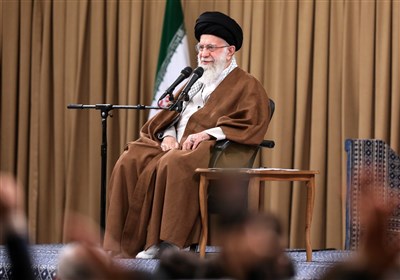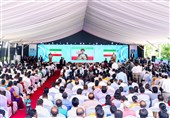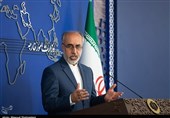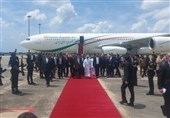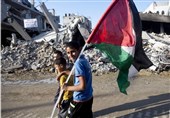Iran’s Zarif: Peace in Syria Vital
TEHRAN (Tasnim) – Iran’s Foreign Minister Mohammad Javad Zarif in an article published by The Guardian on Friday underlined the significance of peace in the war-hit Syria.
The full text of Zarif’s article is as follows:
The International Syria Support Group has provided a unique forum for important discussions among a number of significant players, and there is genuine potential to turn the existing political will to help forge peace into tangible action towards this noble end.
Focus must turn to the political process, and the imperative of a unified front against extremist violence. Yet progress continues to be hindered by preconditions which have prolonged the violence and bloodshed for four years. Indeed, what is most ironic and distressing about these preconditions is that they do not represent the wishes of the Syrian people; rather, they reflect the agendas of outside actors, none of whom have the right to impose their will on an independent nation.
The Syrian people do not need guardians. The age of mandates and protectorates is long gone. It is utterly absurd that those who have denied their own population the most rudimentary tenets of democracy, such as a constitution and elections, are now self-declared champions of democracy in Syria. Their democracy, however, is not to give Syrians a voice, but instead to thwart the political process by stonewalling a ceasefire, while pushing for self-proclaimed al-Qaida affiliates to have a prominent place at the negotiating table.
Indeed, it is alarming that some are oblivious to how bands of villains such as Isis or al-Qaida’s multiple incarnations and reincarnations are a common threat to all of us, including their patrons. It is delusional to believe that sponsoring these terrorists, directly or through their newborn ideological siblings, can ever be an asset or leverage to achieve even short-term political objectives. Yet those who support militant extremism are not only continuing to do so, but they sponsor terror with impunity. They even use their political patronages and web of lobbyists to seek to legitimise such assistance, and its recipients, by differentiating between “good terrorists” and “bad terrorists”.
Beyond slaughtering countless innocents, the hooded villains have proven that while terrorism has no religion, no nationality or ethnic background, it certainly has backers with known addresses and horrific agendas. Ask Syrians. Or Iraqis, who during the past 12 years have been the target of almost 2,000 suicide bombings. The perpetrators of these atrocities, and those who created carnage in New York, London, Madrid, Peshawar, Beirut, Tunis, Paris and San Bernardino all have one common thread. They were all radicalised by demagogues preaching the same petro-fuelled perversion of Islam.
What happened in New York that fateful September morning 14 years ago, and the response, is directly linked to the tragedies in Paris, Beirut and San Bernardino during the past few weeks. Despite its immense cost of hundreds of thousands of lives and more than $400tn, the so-called “war on terror” has failed to achieve its purported objective. The perverted ideology behind groups such as al-Qaida not only lives, but thrives. It has spawned ever more vile manifestations of raw hatred and open thirst for blood. Hooded villains are now ravaging the cradle of civilization.
Terrorists should never have been allowed to set the agenda, or dictate the response. These villains are the offspring of indiscriminate retribution, failure to unite in confronting the roots of terrorism, and continued impunity extended to those so-called allies who perceive extremism as an asset or leverage. We must all recognise that security cannot be achieved at the expense of the insecurity of others. Unless there is a serious change in the course of action, violent extremism will haunt us all, including the hands that feed it.
Make no mistake: for the past four years, Syria has been ground zero in nothing short of a paramount fight for our future. I say “our” – repeating the theme of a recent message by Ayatollah Khamenei, who called the menace of perverted extremism “our common worry” – because the world’s fate is common. No one is immune from the consequences of the outcome of the existential battle that we need to fight.
From the outset of the Syrian crisis, Iran’s position has rested on three pillars: respect for the wishes and free will of the Syrian nation to decide its own destiny and to manage its own affairs; opposition to foreign interference geared to impose the wishes of outside actors on an independent people; and rejection of terrorism as a tool to achieve political objectives.
Based on these pillars, Iran has always insisted that there is no military solution to the Syrian crisis. Only ballots – not bullets – can ultimately usher in a new era in Syria. To this end, Iran has consistently advocated an immediate ceasefire and an end to the bloodshed; dialogue between the Syrian government and the opposition groups who reject terrorism; a concerted and genuine international effort to uproot extremist violence; and a global campaign to address the humanitarian catastrophe now, and to rebuild Syria once the flames of war subside.
The International Syria Support Group should encourage, facilitate and enable Syrians to change the course of their future, and by extension, change the course of our collective future. To do so, all must join hands to put into effect an immediate end to the bloodshed and vigorously focus on promoting an inclusive intra-Syrian political process, bringing together all Syrians with a vested interest in a brighter tomorrow. We must close ranks in the fight against extremist violence and terror, while not allowing rage to come in the way of collective reflection and wisdom for a rational and joint response.
Most importantly, we must together work to confront the roots of extremist violence, including double standards, marginalisation, repression, xenophobia and Islamophobia. If not, our children, and their children, will be forced to. And at much greater cost.


